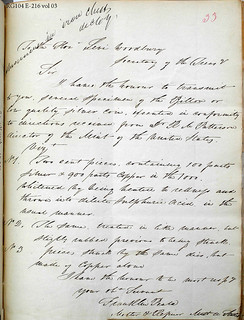
PREV ARTICLE
NEXT ARTICLE
FULL ISSUE
PREV FULL ISSUE
TRANSCRIPTION IS A BOOMING PANDEMIC ACTIVITYAt the end of March we put out a call to augment Roger Burdette's team of volunteers transcribing National Archives documents related to numismatics, and several readers quickly responded. Thank you! -Editor Roger writes:
Roger has all the transcription help he needs at the moment, but there are plenty of interesting opportunities to hone your skills outside of numismatics. This Washington Post article describes how transcription is a booming volunteer activity these days. -Editor In April, as the novelty of lockdown Netflix binges began wearing off around the world, Meghana Venkataswamy came across a blog post that piqued her curiosity. The Smithsonian Institution, which increasingly relies on the general public to transcribe historical documents, was looking for volunteers to work on astronaut Sally Ride's papers. Venkataswamy, a 28-year-old data engineer in Vancouver, signed up and quickly got sucked down the rabbit hole of history. Channeling her "inner Sherlock Holmes," as she put it, Venkataswamy cruised through Ride's letters, then moved on to World War II diaries, the field notes of biologists on remote expeditions, and 19th-century Japanese and Indian stereographs. "There is a strange meditative aspect to it," Venkataswamy said. "It's enough to take one's mind off of whatever else is happening in their lives" — including a pandemic. "A good respite from crazy times." Worldwide, museums and research libraries are reporting huge spikes of do-it-yourself historians such as Venkataswamy. With so many staples of daily life out of reach, these digital stenographers are reaching into history to put their quarantine time to good use, soothing their psyches in the process. "I think we all expected there would be an influx with so many people staying at home," said Victoria Van Hyning, who is one of the community managers for the transcription project at the Library of Congress. But the number of sign-ups has been staggering, officials said, and is growing exponentially. Teachers scrambling for engaging distance learning projects sign up their students, who in addition to learning about cool historical figures have also discovered something called cursive writing. In Washington, the Library of Congress reports a fivefold jump in new transcriber accounts since mid-March. The Smithsonian has seen new transcribers jump from 100 to 200 per month in pre-pandemic times to more than 5,000 per month now, according to Caitlin Haynes, the project's coordinator. Organizations are scrambling to upload documents to meet the insatiable demand. To read the complete article, see:
To read the earlier E-Sylum articles, see:
Wayne Homren, Editor The Numismatic Bibliomania Society is a non-profit organization promoting numismatic literature. See our web site at coinbooks.org. To submit items for publication in The E-Sylum, write to the Editor at this address: whomren@gmail.com To subscribe go to: https://my.binhost.com/lists/listinfo/esylum All Rights Reserved. NBS Home Page Contact the NBS webmaster 
|
